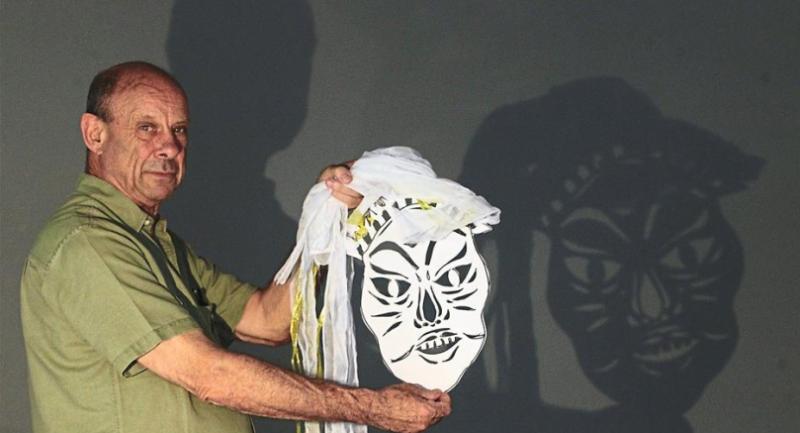Bali’s American shadow master

Larry Reed infuses modern film and theatre techniques into his traditional shadow puppetry
Performers carrying Balinese-style carved masks move upon an empty stage. A single light source casts the masks’ shadows on the wall, growing and shrinking as the performers change positions.
It’s an arresting sight, but just as fascinating is the man directing the performers – a Westerner speaking fluent Malay as he tells them to move ke sana and lebih dekat.
Larry Reed, 72, is one of the few Westerners trained in traditional Balinese shadow theatre (wayang kulit). Over the years he’s performed more than 250 such shows around the world.
Reed is considered a trailblazer in the field of “contemporary shadow theatre”. “What I like about shadow play is that one person can play all the parts,” he says. “Usually, as an actor, you can only play the role that fits your character. Here you can do everything!”
Reed is a dalang – a shadow master. In the course of a show he can manipulate 20 carved leather puppets, conduct the accompanying gamelan orchestra, direct the proceedings and be stage manager as well.
In Kuala Lumpur preparing for a show with the Masakini Theatre Company, he visited local Orang Asli communities to learn more about their song and dance traditions.
“Malaysian shadow puppetry is closer to its Thai than Balinese cousins,” Reed says. “The puppets look the same as the Thai ones. And the music is completely different. Here it’s mostly percussion.
“The stories are similar, though. Like the Ramayana, they all came from India and later became part of the local culture in some way.”
Growing up in Los Angeles, Reed was fond of theatre and films, but he was never completely satisfied with either.
“I had this idea in my mind and as I described it to people they told me I should go to Bali. I didn’t want to – I thought it was going to be this touristy thing – but went I got there it was really interesting. One day I went to see a shadow theatre performance and things really fell into place.”
Back in the United States, Reed discovered the American Society for Eastern Arts (now the Centre for World Music), which had classes on shadow theatre. On his return to Bali he honed his craft under the guidance, amazingly enough, of the father of his first schoolteacher.
In 1972 he founded ShadowLight Productions to nurture indigenous shadow-theatre traditions and explore new possibilities in the medium. His major works – including “In Xanadu”, “The Wild Party”, “Coyote’s Journey” and “A (Balinese) Tempest” – have been presented at festivals and other venues across the US. “Shadow Master”, his 1979 documentary on the family of a Balinese shadow artist, was shown on PBS and the Discovery Channel.
It’s the live aspect of shadow performances that appeals most to him. At times, live onstage, things can go wrong, but it’s always possible to fix them. During a full-house opening-night presentation of his “Seven Visions”, the power went out in the theatre.
“We had to run out and buy candles and flashlights, and improvise both in front and behind the screen,” Reed laughs. “And then we started over again! We had to bring the musicians and voice actors to the front. It was fun!”
In the 1990s Reed opened a new phase in his career by inventing an ingenious way of casting shadows. It integrated techniques from cinema, modern theatre and dance. Many of his shows now combine traditional puppetry elements with contemporary touches, such as voice-overs, projections, graphics and complicated light sources.
Asked whether shadow theatre can survive in the age of hi-tech entertainment, he avows that it’s the low-tech format of shadow theatre that makes it unique.
“I think it’s okay to mix in some hi-tech elements, but the low-tech aspect is important. We’re so used to seeing so much hi-tech stuff that sometimes it’s a relief for people to see something that isn’t computer-animated. Hopefully it helps people appreciate something very basic.
“That’s the power of the shadows. It’s different from cartoons or movies. It’s closer to dreams.”





